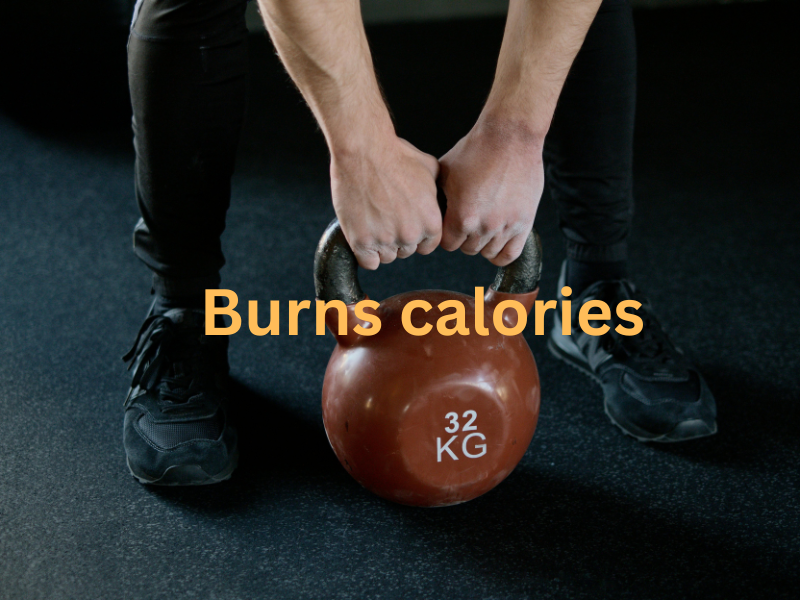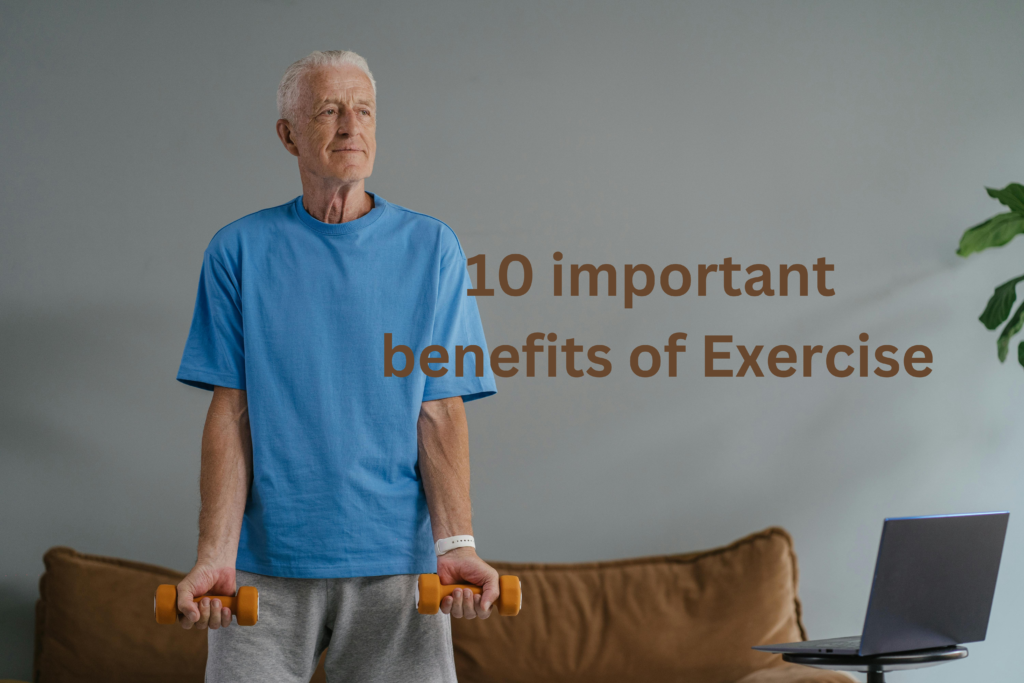The benefits of exercise refer to the positive effects that physical activity has on the body and mind. It improves physical health such as cardiovascular fitness, muscle exercise helps with weight
- 1. Improves Heart Health:
Exercise strengthens the heart and improves circulation, At least 30 minutes a day, at least five days a week, exercise lowers the risk of heart disease, high blood pressure, and stroke. Heart exercises include Brisk walking, running, cycling, tennis, and jumping rope. It’s one of your most effective tools for strengthening the heart muscle, keeping your weight under control, and warding off artery damage from high cholesterol and blood sugar that can lead to heart attack or stroke.
2. Aids in Weight Management:
Regular physical activity helps burn calories, reduce body fat, and maintain a healthy weight. Exercise is one of the most effective ways to aid in weight management, especially for kids. Regular physical activity helps balance the calories consumed from food with the calories burned during activities, which is critical for maintaining a healthy weight. Here’s how exercise contributes to weight management.
Reduce body Fat: When children are active, they break down stored fat for energy, gradually reducing body fat levels. Over time, regular exercise helps prevent the accumulation of excess fat, contributing to a healthier body composition

Burns calories: Exercise energy expenditure, meaning it helps burn calories. When children engage in activities like running, playing sports, or biking, their bodies use the energy stored in food, preventing excess calories from being stored as fat.
3. Boosts Mental Health :
Exercise releases endorphins, which reduce stress, anxiety, and symptoms of depression, leading to a better mood and overall mental well-being. Exercise isn’t just about building aerobic capacity or increasing muscle size. While it certainly improves physical health, trims the waistline, enhances your physique, and even extends your life, these benefits don’t always motivate most people to stay active.
For many, regular exercise is a key to a sense of overall well-being. People who exercise consistently report feeling more energetic throughout the day, enjoying better sleep at night, and experiencing sharper memory. They feel more relaxed, positive about themselves, and optimistic about their lives. Exercise also serves as a powerful remedy for many mental health challenges.
Exercise and Mental Health
Regular physical activity has been shown to have a profoundly positive impact on mental health, helping with conditions such as depression, anxiety, and ADHD. In addition to relieving stress, it improves memory, enhances sleep, and boosts overall mood. And the best part? You don’t need to be a fitness fanatic to experience these benefits. Even modest amounts of physical activity can make a real difference. No matter your age or fitness level, you can use exercise as a powerful tool to tackle mental health issues, improve your energy, and get more enjoyment out of life.
Exercise and Depression:
Exercise is as effective in treating mild to moderate depression as antidepressant medication—without the potential side effects. For example, a study conducted by Harvard T.H. Chan School of Public Health found that running for just 15 minutes a day or walking for an hour reduced the risk of major depression by 26%. Beyond relieving symptoms, research shows that sticking to an exercise routine can help prevent relapses.
There are several reasons why exercise is such a potent fighter against depression. First, it promotes positive changes in the brain, including the growth of neurons, reduced inflammation, and the development of new activity patterns that foster calm and well-being. Exercise also triggers the release of endorphins, powerful chemicals in the brain that energize your spirits and make you feel good. Lastly, exercise can serve as a helpful distraction, breaking the cycle of negative thoughts that often contribute to depression.
Exercise and Anxiety:
Exercise is also a natural and effective way to combat anxiety. Physical activity relieves tension, reduces stress, and boosts both physical and mental energy, all while triggering the release of endorphins, which enhance your sense of well-being. Any physical activity that gets you moving can help, but you can gain even greater benefits by practicing mindfulness during your workout.
For example, instead of zoning out, pay attention to the sensations of your body—your feet hitting the ground, the rhythm of your breathing, or the feeling of the wind against your skin. By focusing on these physical sensations, you can not only improve your physical condition faster but also interrupt the flow of worries that fuel anxiety.
Exercise and Stress:
Stress manifests in the body as much as it does in the mind. When you’re stressed, you may feel tension in your muscles—especially in the face, neck, and shoulders—which can lead to back pain, headaches, or other discomforts. Stress can also cause physical symptoms such as tightness in the chest, a pounding pulse, muscle cramps, insomnia, indigestion, and even diarrhea. These physical issues often add to your stress, creating a vicious cycle.

4. Increases Muscle Strength and Endurance
Physical activity builds muscle, improves strength, and enhances endurance, helping with daily tasks and physical performance.
Improves Physical Performance:
Muscular strength allows you to perform everyday tasks and strenuous activities more efficiently, from lifting heavy objects to participating in sports, without tiring quickly. It enhances endurance and reduces the risk of injury during physical exertion.
Supports Healthy Weight Management:
Building muscle helps burn calories more effectively, even at rest. By increasing muscle mass, you enhance your body composition, which is the ratio of muscle to fat. This helps maintain a healthy body weight and promotes a leaner physique.
Boosts Mood and Energy Levels:
Strength training triggers the release of endorphins, which can elevate your mood and increase energy. It also promotes better sleep, helping regulate your sleep-wake cycle, and enhancing overall mental and physical well-being.
Promotes Confidence and Accomplishment
As you build strength, you gain a sense of accomplishment and increased confidence. Being able to lift heavier weights or perform more challenging exercises over time is a visible and rewarding sign of progress.
Builds Stronger Muscles and Bones
Strength training not only develops muscles but also enhances bone density, reducing the risk of osteoporosis and fractures. Stronger muscles and bones contribute to better posture, reduce back pain, and support overall structural health.
Enhances Stability, Balance, and Flexibility
Muscular strength improves your body’s stability and balance, making you less prone to falls and injuries. It also enhances flexibility, allowing for a greater range of motion in your joints and more fluid movement.
5. Improves Bone Health:
Weight-bearing exercises increase bone density, reducing the risk of osteoporosis and fractures, especially as you age.
6. Enhances Flexibility and Balance
Exercises like yoga and stretching improve flexibility and balance, which helps prevent falls and injuries, especially in older adults.
7. Boosts Brain Function
Regular exercise improves memory, cognitive function, and mental clarity, reducing the risk of cognitive decline and conditions like Alzheimer’s.
8. Promotes Better Sleep
Physical activity improves the quality of sleep, helping you fall asleep faster and stay asleep longer.
9. Strengthens the Immune System
Exercise can enhance the body’s ability to fight off infections and illnesses by boosting immune function. Physical activity enhances the production of white blood cells (lymphocytes), which are crucial for fighting off infections. Regular exercise helps regulate inflammation, which can contribute to chronic diseases and weaken immune responses. Regular exercise helps regulate inflammation, which can contribute to chronic diseases and weaken immune responses. Exercise reduces stress hormones like cortisol, which can suppress the immune system when elevated over long periods. Physical activity can improve the body’s response to vaccines by promoting the production of antibodies. Quality sleep is essential for a healthy immune system, and exercise helps regulate sleep patterns. Being physically active contributes to maintaining a healthy weight, reducing the risk of obesity-related immune system issues.
10. Increases Longevity:
Regular physical activity is associated with a longer lifespan, reducing the risk of premature death from various causes. Exercise strengthens the heart and improves blood circulation, reducing the risk of heart diseases such as heart attacks, hypertension, and stroke. A healthy cardiovascular system is crucial for longevity. Regular physical activity can lower the risk of developing chronic conditions such as Type 2 diabetes, certain cancers (e.g., colon and breast cancer), and metabolic syndrome. Preventing or managing these diseases contributes to a longer life. Maintaining a healthy weight through exercise reduces the likelihood of obesity, which is linked to various life-shortening diseases, including heart disease, diabetes, and certain cancers. Physical activity reduces symptoms of depression, anxiety, and stress, which are associated with shorter lifespans. Better mental health improves overall quality of life and promotes longevity.


